| dc.contributor.advisor | Herrmann, Peter | nb_NO |
| dc.contributor.advisor | Khan, Mohammad Ullah | nb_NO |
| dc.contributor.author | Imtiaz-Ud-Din, K.M | nb_NO |
| dc.date.accessioned | 2014-12-19T14:14:18Z | |
| dc.date.available | 2014-12-19T14:14:18Z | |
| dc.date.created | 2011-09-23 | nb_NO |
| dc.date.issued | 2011 | nb_NO |
| dc.identifier | 443185 | nb_NO |
| dc.identifier | ntnudaim:6310 | nb_NO |
| dc.identifier.uri | http://hdl.handle.net/11250/262478 | |
| dc.description.abstract | In recent years, technologies in the area of ubiquitous computing have experienced a great advancement. This has resulted in a wide-spread use of services in order to improve the quality of our daily life. For example, a person with a mobile device can use the services available in the ubiquitous computing environment to plan and execute his or her travel, to connect to family and friends, to perform his or her researches, even to manage his or her business. However, most of the services are dynamic in nature in terms of their availability, robustness and the mobility of the user. These services also appear impermeable to the end users i.e. the end users do not get to control and configure the services in a way so as to feel like programmers developing services to accomplish certain goals. We envisage that in such a context end users, with no programming knowledge, will have a hard time to find services of their choice and that it will be hard for these end users to derive substantial benefits from these services. Unguided automation is not the answer to this problem as a particular service suggested automatically by a dynamic composition mechanism may not be suitable for a specific user at a certain point of time and in a given context. On the other hand explicit specification of service instances will mean that the user will be bogged down with the problem of runtime optimization in a dynamic environment where several factors as indicated earlier determine the availability of the services having required functionality. In order to address this issue we introduce the notion of intelligent service composition where the end user will have a great degree of flexibility to define his or her own rules or conditions based on which an optimal composition will be made automatically from a set of collaborative services by runtime adaptation in a specific context and point in time. This is a step forward compared to the present dynamic composition mechanisms which do not facilitate end users defining their own conditions dictating the selection of specific service instance at runtime. We have developed this conceptual solution to bring end users towards adaptive use of services. We validated our conceptual solution through a scenario-based evaluation approach with an implementation of a proof-of-concept prototype. | nb_NO |
| dc.language | eng | nb_NO |
| dc.publisher | Institutt for telematikk | nb_NO |
| dc.subject | ntnudaim:6310 | no_NO |
| dc.subject | MSSECMOB Master in Security and Mobile Computing | no_NO |
| dc.subject | | no_NO |
| dc.title | Collaboration-based intelligent service composition at runtime by end users | nb_NO |
| dc.type | Master thesis | nb_NO |
| dc.source.pagenumber | 122 | nb_NO |
| dc.contributor.department | Norges teknisk-naturvitenskapelige universitet, Fakultet for informasjonsteknologi, matematikk og elektroteknikk, Institutt for telematikk | nb_NO |

